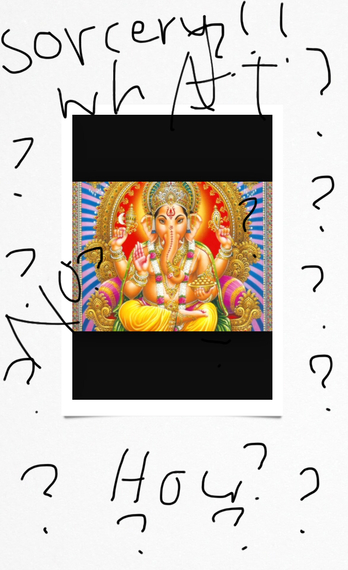As a young brown girl growing up in suburban San Diego, I was an anomaly at times, being one of few Hindus in a town that was proudly Judeo-Christian. In the sixth grade, our teacher taught us about Judaism and Christianity. Now, being the nerd I was, I was fascinated by these topics. My favorite part of the lesson was learning about the stories in the Old and New Testament. I still remember the tales of Abraham and God's covenant, the birth of Isaac and the journeys of the apostle, Paul.
I wanted to be an "all-theist," dabbling into every religion. I saw myself as the girl version of young Pi Patel, trekking into various religious holdings, finding God in a church, mosque, synagogue and a Buddhist temple. To me, all faiths shared similarities, and my childhood naiveté could not comprehend tension and factionalism within and between these religions. I was also incapable of understanding why my teacher went so in-depth with the Abrahamic faiths, but skipped over the eastern religions, including mine.
I was too young to register subtle bigotry exuded by some fellow students. A common form of racial micro-aggression is the "rhetorical question," whereby a peer will ask a question that's meant as a cultural jab, rather than a genuine question. I received many of these growing up:
"Don't you pray to cows?"
"Why do you guys believe in all these Gods, I mean isn't there just one?"
"Do you speak Hindu?" (Really? I mean come on.)
I believe the worst of these questions started with "So I saw Indiana Jones Temple of Doom, and..." Whatever followed was never good.
These snide questions were just the tip the iceberg, trust me.
As I matured, I began to realize preconceived notions about Hinduism were the only knowledge of Hinduism my peers really had. Paranoid and narrow-minded religious parents in Encinitas feared schools teaching their children yoga would lead to their imminent conversion to Hinduism (muhahaha). This gave me an idea of how Hinduism was viewed by some people. To many, we were voodoo idol worshipers. People who believed in a ridiculous amount of Gods. It was sorcery what we believed in! Blue skinned Gods? Goddesses with multiple hands?
There wasn't much I could do as a child except internalize much of this bigotry. There was a point in childhood where I pictured how much easier it would be if I was the same religion and went to church like everyone else in my community. I mean hey, I would get to see all of my friends from school!
I wondered...why do we believe in all these gods and goddesses? I asked my father one day and he explained to me that the concept of many deities was simply a metaphor. It meant that God embodies all qualities, positive and negative. God can take the form of anyone and anything. God could be a woman, if you so believed! I found this fascinating. I wished other kids knew about this, but they never learned about my religion as in-depth as I had learned theirs.
All they really knew were the superficial elements that many self-proclaimed hipsters and "Bohemian" chic fashionistas proudly wear today as "om" symbols, Ganeshs and bindis. (And, it's not "Bohemian," stop calling it Bohemian when it is clearly not from Bohemia.) But of course, these accessories were deemed cool on Kylie Jenner. On Indian girls, it provoked incessant teasing from fellow American classmates.
Sigh. I can't say she doesn't rock it.
As I delved deeper into my roots, I realized Hinduism is more of a philosophy than it is a religion. As hackneyed of a notion as this is, there is no absolute fundamental belief in God in Hinduism. In fact, one could be an agnostic and be a Hindu. One can work within the infrastructures of one's faith and choose core values to identify with. Within such a structure, I admired strong female figures like Kali, goddess of strength and empowerment, and Sarasvati, goddess of wisdom and learning.
I would not consider myself a devout Hindu, because the extent of my knowledge is basic at best. But, I believe that Hinduism is something that will always be a part of my identity, a fountain of spiritual knowledge I can always drink from. If examined closely, every religion shares its core values with one another, has parts of the scripture that make your jaw drop and believes there is something beyond the cycle of life and death.
Whether the end goal is to reach heaven, enlightenment or the image of God, I believe all religions share more commonalities than differences. Every faith is built upon the ideas of the religions that preceded them. This is why I think it is important to thoroughly teach every major world religion in middle school, because children will learn to appreciate difference, but also come to learn how similar we truly are.



